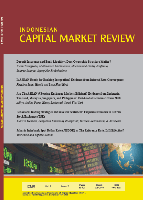
Indonesian Capital Market Review
Scope & Guideline
Transforming Academic Discourse on Financial Systems
Introduction
Aims and Scopes
- Capital Structure and Financial Performance:
Research on how different capital structures affect the financial performance of firms, with a particular focus on non-financial industries. - Islamic Finance and Banking:
Exploration of Islamic banking practices, stability determinants, and the performance of Sharia-compliant financial products in comparison to conventional options. - Impact of Environmental, Social, and Governance (ESG) Factors:
Analysis of how ESG practices influence corporate financial performance, particularly among green companies and their market valuation. - Monetary Policy and Economic Behavior:
Investigations into how monetary policy impacts corporate decision-making, risk-taking behavior, and overall market dynamics. - Technological Influence on Finance:
Studies on the impact of financial technology, including mobile banking and cryptocurrency, on traditional banking systems and investment behaviors. - Market Reactions to External Events:
Examinations of how capital markets respond to significant events such as geopolitical risks, pandemics, and social disruptions. - Investor Behavior and Market Trends:
Research focused on understanding investor psychology, including the effects of social media and celebrity influence on investment decisions.
Trending and Emerging
- Impact of COVID-19 on Financial Markets:
A significant increase in studies analyzing the ramifications of the COVID-19 pandemic on various financial sectors, including Islamic finance, investment behaviors, and market reactions. - Cryptocurrency and Digital Finance:
Growing research on cryptocurrency investment and its implications for traditional markets, reflecting the increasing relevance of digital currencies among investors. - ESG and Sustainable Investing:
An upward trend in research focusing on ESG factors and their impact on corporate performance, highlighting the shift towards sustainability in investment decisions. - Behavioral Finance and Investor Psychology:
Emerging interest in understanding how social media and influencer impacts affect investor decisions, indicating a shift towards behavioral finance as a crucial area of study. - Technological Innovations in Banking:
Increased focus on the role of technology in banking, particularly the adoption of mobile banking and fintech solutions among Islamic bank users, reflecting a technological transformation in the finance sector.
Declining or Waning
- Traditional Investment Analysis:
Research focusing solely on traditional investment analysis methods is becoming less prominent as newer methodologies and technologies emerge, such as behavioral finance and fintech. - General Economic Theories:
Papers centered around broad economic theories without specific context or application to capital markets are less frequent, suggesting a move towards more applied and empirical studies. - Basic Corporate Finance Practices:
Topics related to fundamental corporate finance practices are declining as researchers increasingly explore complex interactions between finance, technology, and market dynamics.
Similar Journals
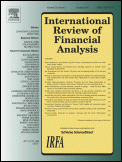
International Review of Financial Analysis
Pioneering high-impact research in finance and economics.The International Review of Financial Analysis, published by Elsevier Science Inc, is a premier journal dedicated to advancing the fields of finance and economics. With an impressive impact factor and ranked in the top quartile (Q1) of both Economics and Econometrics and Finance categories, this journal is recognized for its high-quality research and significant contributions to the discipline. Since its inception in 1992, it has provided a platform for scholars to present innovative theories and empirical studies that address critical financial issues around the globe, making it a vital resource for researchers, professionals, and students alike. Although it does not offer open access, the journal actively engages with contemporary debates in financial analysis, ultimately empowering its readership to contribute to and benefit from the ongoing discourse. With its convergence of financial research and analytical methodologies through 2024, the International Review of Financial Analysis remains a cornerstone in the pursuit of knowledge within the ever-evolving landscape of finance.
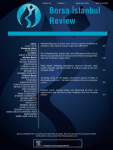
Borsa Istanbul Review
Exploring the forefront of financial innovation.Borsa Istanbul Review, published by ELSEVIER, is a premier open-access journal making significant contributions to the field of Economics and Finance since its inception in 2013. With a commendable Q1 rating in both categories according to the 2023 metrics, this journal ranks impressively at #36 out of 317 in Finance and #91 out of 716 in Economics and Econometrics on Scopus, placing it in the top tier of international academic publications. The journal not only provides a platform for rigorous and innovative research but also aims to foster a deeper understanding of the evolving economic landscape, particularly within the frameworks of emerging markets. Catering to researchers, professionals, and students alike, Borsa Istanbul Review is dedicated to delivering high-quality, peer-reviewed scholarly articles that are freely accessible to enhance global research collaboration. It serves as an essential resource for anyone looking to stay abreast of cutting-edge developments in the financial and economic sectors.
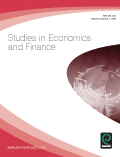
Studies in Economics and Finance
Driving dialogue among scholars and practitioners.Studies in Economics and Finance is a distinguished journal published by Emerald Group Publishing Ltd, based in the United Kingdom. With an ISSN of 1086-7376 and an E-ISSN of 1755-6791, this journal has been a significant contributor to the fields of economics, econometrics, and finance since its inception, with coverage ranging from 1977 to the present. Ranked in the second quartile (Q2) for 2023 in its relevant categories, it holds a reputable position within the 83rd percentile in the general economics, econometrics, and finance fields according to Scopus rankings. This journal aims to disseminate cutting-edge research that addresses key issues and emerging trends in the economic and financial landscapes, fostering dialogue among scholars, practitioners, and policymakers. Although it does not operate under an Open Access model, Studies in Economics and Finance continues to be an essential resource for advancing knowledge and providing insights that are crucial for understanding complex economic behaviors and financial systems.

EKONOMICKY CASOPIS
Empowering Economic Insights for Tomorrow's ChallengesEKONOMICKY CASOPIS is a distinguished journal published by the Institute of Economics Research SAS and the Institute of Forecasting CSPS SAS, offering a comprehensive platform for the dissemination of innovative research in the field of economics and econometrics. Since its inception in 1978, the journal has been committed to fostering scholarly discourse, showcasing empirical studies, theoretical advancements, and policy analyses that contribute to the understanding of economic phenomena. Although categorized in the Q4 quartile in 2023 and ranking in the lower percentiles within Scopus, EKONOMICKY CASOPIS remains a critical resource for researchers and practitioners seeking to engage with the economic challenges of our time. As the journal continues to evolve through 2024, it invites contributions that align with its objectives of enhancing economic insights and promoting academic discussion in Slovakia and beyond. For researchers looking to publish their work or expand their knowledge, EKONOMICKY CASOPIS serves as a vital resource in the expanding landscape of economic research.
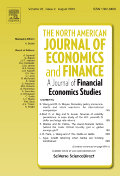
North American Journal of Economics and Finance
Bridging theory and practice in finance and economics.The North American Journal of Economics and Finance is a premier academic journal published by Elsevier Science Inc. since 1992, dedicated to advancing the field of economics and finance through rigorous research and scholarship. With an impressive impact factor and recognition in the Q2 category for Economics and Econometrics and Q1 for Finance as of 2023, this journal holds a significant position in the academic community, ranked #41 out of 317 in Finance and #100 out of 716 in Economics. The journal features high-quality, peer-reviewed articles that cover a broad range of topics, from theoretical frameworks to empirical analyses and practical applications. Though not an open-access platform, the journal provides valuable insights for researchers, practitioners, and students alike, promoting knowledge dissemination in the dynamic landscape of economic and financial studies. With its commitment to excellence, the North American Journal of Economics and Finance serves as an essential resource for those seeking to deepen their understanding of contemporary issues in these critical fields.
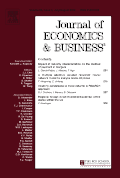
JOURNAL OF ECONOMICS AND BUSINESS
Connecting Ideas to Impact in the Economic SphereJOURNAL OF ECONOMICS AND BUSINESS, published by Elsevier Science Inc, stands as a leading platform for the dissemination of research in the fields of economics and business management. With an ISSN of 0148-6195, this journal is indexed in Scopus and boasts impressive rankings, including a position in the top 20% for both Finance and Economics and Econometrics. With a consistent publication history since 1978, it has become a vital resource for scholars and practitioners alike, providing insights into contemporary issues and emerging trends in the economic landscape. The journal, categorized in the Q2 quartile for both Business and Economics, invites rigorous research that advances theoretical and practical knowledge. While it operates under a subscription model, its notable impact factor reflects its significance and relevance in addressing critical questions within the business and economics domains. Whether you are a researcher, a business professional, or a student eager to deepen your understanding, the JOURNAL OF ECONOMICS AND BUSINESS is an essential resource for your academic and professional journey.

African Review of Economics and Finance-AREF
Navigating Economic Challenges with Scholarly PrecisionAfrican Review of Economics and Finance (AREF) is a distinguished academic journal dedicated to advancing knowledge in the fields of economics and finance within the African context. Published by PORTHOLOGOS PRESS, the journal aims to provide a platform for research that addresses critical economic and financial issues that affect Africa, promoting innovative solutions and fostering discussion among scholars and practitioners. With its ISSN 2042-1478 and E-ISSN 2410-4906, AREF has established itself as a vital resource for researchers, professionals, and students seeking to deepen their understanding of African economies. The journal’s commitment to open access ensures that its valuable research findings are readily available to a global audience, thereby enhancing visibility and engagement. Through rigorous peer-review processes and thoughtful editorial leadership, AREF contributes significantly to the discourse on economic development, policy analysis, and financial practices in the region.
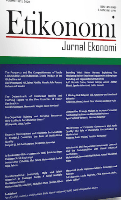
Etikonomi
Empowering scholarly dialogue in economics and business.Etikonomi is a reputable academic journal dedicated to advancing the field of economics and business studies. Published by the Syarif Hidayatullah State University Jakarta, this journal has been an open-access platform since 2012, facilitating the widespread dissemination of research and ensuring that valuable economic insights are accessible to a global audience. Researchers, professionals, and students can benefit from Etikonomi's commitment to fostering scholarly dialogue and critical analysis within the ever-evolving landscape of economic theory and practice. The journal serves as a vital resource for those looking to stay abreast of the latest developments and trends in the field, making it an essential inclusion in any academic library or researcher's collection.

European Journal of Finance
Pioneering research that informs financial practice.European Journal of Finance is a prestigious publication specializing in the domains of finance, economics, and econometrics, published by Routledge Journals, Taylor & Francis Ltd. Established in 1995, this journal has become a vital resource for researchers, practitioners, and students, contributing significantly to the understanding of financial systems and markets. With its Q1 ranking in the Economics, Econometrics and Finance category, it stands out for its rigorous peer-reviewed articles that explore innovative theories, models, and empirical studies. The journal's impressive Scopus ranking of 35 out of 242 highlights its impact and relevance within the field, with an 85th percentile standing that underscores its importance to current financial research. Although it does not offer open access, the European Journal of Finance remains a cornerstone for those seeking to delve deeper into the complexities of finance, equipped with insights that drive both academic inquiry and practical application.
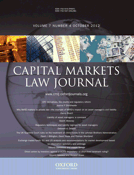
Capital Markets Law Journal
Navigating the Intersection of Finance and Law.Capital Markets Law Journal, published by the esteemed Oxford University Press, serves as an essential resource for scholars and practitioners within the realms of finance and law. Established in 2006, the journal has rapidly gained recognition, as evidenced by its respectable impact factor and its classification in the Q2 for Law and Q3 for Finance in the 2023 category quartiles. The journal's scope encompasses a wide variety of topics relevant to capital markets, including regulatory frameworks, legal innovations, and market dynamics, making it an invaluable platform for disseminating cutting-edge research. The journal is committed to fostering academic discourse while also catering to the needs of professionals seeking insights into current trends and legal interpretations affecting capital markets. Although it is not an open-access publication, readers affiliated with institutions often have access through university libraries. Situated in the heart of the United Kingdom, Capital Markets Law Journal continues to shape discussions and drive forward-thinking in an ever-evolving field.